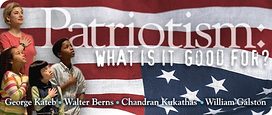To Professor Berns
I have been trying to suggest that patriotism is a feeling that is at the disposal of all countries, no matter what cause they pursue by means of war. Patriotism cannot be a principle of conduct because it is without any inherent moral commitment. Its most important meaning is that unreserved loyalty to one’s country in time of war — whatever one’s country is — is to be expected and praised. In U.S. history, it took the Northern states four years to defeat the Confederacy because, in part, Southern patriotism for the Confederacy was, if anything, stronger than that of the North for the Union. How we can defend patriotism just for the side we’re on or even the side that we think is morally superior? It’s not in our power to distribute patriotism as we please. I’m as happy as Berns that the U.S. and its allies defeated Germany and Japan in World War II. But we mustn’t forget the enormous strength that patriotism gave these two enemies.
If we imagine the inwardness of patriots on all sides, what’s the difference between them? They’re all patriots who want to be patriotic; they’re inwardly all on the same level. It’s luck that happens to put a person on the morally right side. On the other hand, devotion to the right, not to one’s side just because it is one’s side, shows fidelity to a higher standard. The world is full of patriots, but wouldn’t it be better off if no one were a patriot?
To Professor Kukathas
I of course don’t think that patriotism is the only cause of war and international coercion. I say, rather, that elites know from the start that once a country is involved in war, no matter for what reason, the great majority will rally behind the government. Elites are emboldened to do what they otherwise would not imagine doing. The historical record gives many examples. Think of the how the German labor movement fought so bravely for the German government in World War I, and how, at the start, the parliamentary representatives of that movement, against their better instincts, voted to grant the government war credits. Think of how the strong isolationist movement in the U.S. in the 1930′s became instantly patriotic after Pearl Harbor, even though some citizens knew beforehand that FDR was making economic life untenable for the Japanese and that he meant to involve the U.S. in a global conflict eventually and was waiting for his opportunity. Whether people are successfully duped or fully attentive to what is going on, they will patriotically support a government in time of war. That fact is known to elites; their knowledge of basic human behavior makes their wars inevitable. Patriotism is inculcated from an early age and can remain mostly tacit (except on holidays and ceremonial occasions) for a long time. It is a latent and pervasive ideology. But certain issues and crises can bring it to the surface and make its presence and force blatant.
My critique of patriotism is part of a more extended critique of group identity, which I know is impossible to get rid of. I only ask that those who spend time thinking about political theory shouldn’t become enthusiasts for the group. People shouldn’t be given elaborate theoretical justification for loving their group so much that the divisions between societies become like absolute differences in nature. Patriotism reinforces this tendency by entwining group identity with the unexamined masculine idea of team, team spirit, and team sports between us and them. Ethnocentrism, racist pride, and religious arrogance all do their part in supporting group identity and help to provide the spark and the fuel for war. If elites often get the major benefits of a successful war, patriotism helps to dim awareness of the motives behind war, and thus to minimize popular resentment.
Randolph Bourne, an exemplary thinker, said that war is the health of the state. I just say that patriotism keeps the war-spirit in good health.

